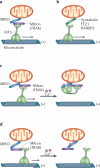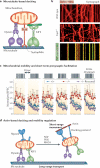Mitochondrial transport in neurons: impact on synaptic homeostasis and neurodegeneration
- PMID: 22218207
- PMCID: PMC4962561
- DOI: 10.1038/nrn3156
Mitochondrial transport in neurons: impact on synaptic homeostasis and neurodegeneration
Abstract
Mitochondria have a number of essential roles in neuronal function. Their complex mobility patterns within neurons are characterized by frequent changes in direction. Mobile mitochondria can become stationary or pause in regions that have a high metabolic demand and can move again rapidly in response to physiological changes. Defects in mitochondrial transport are implicated in the pathogenesis of several major neurological disorders. Research into the mechanisms that regulate mitochondrial transport is thus an important emerging frontier.
Figures



References
-
- Nicholls DG, Budd SL. Mitochondria and neuronal survival. Physiol. Rev. 2000;80:315–360. - PubMed
-
- Verstreken P, et al. Synaptic mitochondria are critical for mobilization of reserve pool vesicles at Drosophila neuromuscular junctions. Neuron. 2005;47:365–378. [This paper shows that in D. melanogaster with mutant DRP1, the loss of mitochondria from neuromuscular junctions results in faster depletion of synaptic vesicles during prolonged pulse train stimulation owing to a specific defect in mobilizing reserve pool vesicles.] - PubMed
-
- Attwell D, Laughlin SB. An energy budget for signaling in the grey matter of the brain. J. Cereb. Blood Flow Metab. 2001;21:1133–1145. - PubMed
Publication types
MeSH terms
Substances
Grants and funding
LinkOut - more resources
Full Text Sources
Other Literature Sources
Medical

